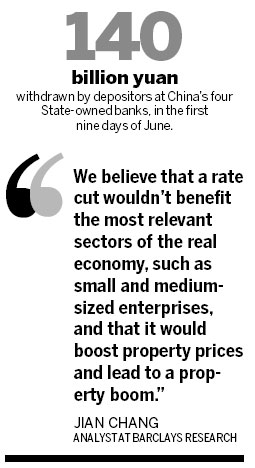
A massive withdrawal of deposits in early June has put a major squeeze on some banks, forcing them to increase their borrowings in the interbank market to meet their obligations.
Depositors at China's four State-owned banks withdrew up to 140 billion yuan ($22.70 billion) in the first nine days of June. Meanwhile, lending by these banks increased a combined 217 billion yuan, according to a report in the Securities Daily.
Banking sources said that much of the money withdrawn was invested in high-yielding wealth management products, particularly currency funds targeting corporate and local government bonds.
The squeeze came at a time when banks are required to complete their mid-year filings to watchdogs including the People's Bank of China and the China Banking Regulatory Commission. Some banks are busy scrambling for money to shore up their books.
The surge in demand has also caused wide swings in short-term rates in the otherwise staid interbank market.
The Shanghai Interbank Offered Rate, or Shibor, a benchmark of funding costs calculated on the platform of the National Interbank Funding Center in Shanghai, surged on Wednesday.

The overnight rate rose a whopping 206.4 basis points to 7.66 percent, while the one-week rate jumped 137.2 points to 8.075 percent. The one-week rate fluctuated between 2 percent and 5 percent between early January and late May.
"The Shibor may dive back to normal levels in July and August because a large amount of PBOC bonds and bills will mature by mid-July," a trader said.
While some traders are complaining that the central bank is not offering any help to ease the cash crunch, analysts said that the PBOC is unable to quickly adjust the reserve requirement ratios because that would have a long-term impact on the money market. The regulator, however, may further liberalize interest rates, they added.
Jian Chang, an analyst at Barclays Research, said the probability of a cut in interest rates has increased after the May inflation and economic activity data were released.
"We believe that a rate cut wouldn't benefit the most relevant sectors of the real economy, such as small and medium-sized enterprises, and that it would boost property prices and lead to a property boom. Hence other policies, such as structural tax cuts, like VAT tax cuts to support the services sector, and targeted policies on the property sector, are needed to complement the macro easing," said Chang.
Chang said that the PBOC may increase the deposit rate ceiling this year, even as it weighs the benefits and costs of a rate cut.
The PBOC reiterated in a report released in early June that it will maintain a prudent monetary policy, while pushing forward interest rate reform this year, along with strengthening the two-way movement of the renminbi exchange rate and a more liberalized capital account.
 Passion for modified Porsche Cayman
Passion for modified Porsche Cayman
 Miss Tourism promotes railway service
Miss Tourism promotes railway service
 Bespoke carmaker opens showroom
Bespoke carmaker opens showroom
 Huawei launches vendor-built service operation center
Huawei launches vendor-built service operation center
 Highlights of ATC Show 2013
Highlights of ATC Show 2013
 AVIC seeks more global co-op at Paris Air Show
AVIC seeks more global co-op at Paris Air Show
 ATC Show 2013 closes in Beijing
ATC Show 2013 closes in Beijing
 Big deals inked at China trade fair
Big deals inked at China trade fair